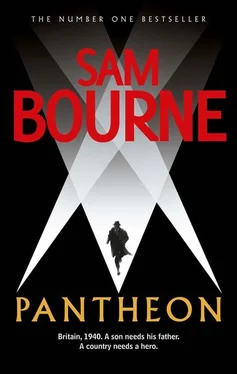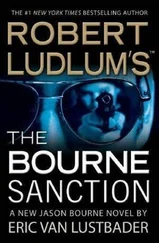Sam Bourne - Pantheon
Здесь есть возможность читать онлайн «Sam Bourne - Pantheon» — ознакомительный отрывок электронной книги совершенно бесплатно, а после прочтения отрывка купить полную версию. В некоторых случаях можно слушать аудио, скачать через торрент в формате fb2 и присутствует краткое содержание. Жанр: Триллер, на английском языке. Описание произведения, (предисловие) а так же отзывы посетителей доступны на портале библиотеки ЛибКат.
- Название:Pantheon
- Автор:
- Жанр:
- Год:неизвестен
- ISBN:нет данных
- Рейтинг книги:3 / 5. Голосов: 1
-
Избранное:Добавить в избранное
- Отзывы:
-
Ваша оценка:
- 60
- 1
- 2
- 3
- 4
- 5
Pantheon: краткое содержание, описание и аннотация
Предлагаем к чтению аннотацию, описание, краткое содержание или предисловие (зависит от того, что написал сам автор книги «Pantheon»). Если вы не нашли необходимую информацию о книге — напишите в комментариях, мы постараемся отыскать её.
Pantheon — читать онлайн ознакомительный отрывок
Ниже представлен текст книги, разбитый по страницам. Система сохранения места последней прочитанной страницы, позволяет с удобством читать онлайн бесплатно книгу «Pantheon», без необходимости каждый раз заново искать на чём Вы остановились. Поставьте закладку, и сможете в любой момент перейти на страницу, на которой закончили чтение.
Интервал:
Закладка:
‘Is she enlightened enough to approve of her husband having got his mistress pregnant?’
A long pause. ‘Virginia is a very understanding woman.’
‘I wonder if she would also understand that you demanded Miss Hodges get an abortion.’
A longer pause, then a reply from Grey delivered with an ice James had not heard before. ‘No one would believe a word you say. These claims would be dismissed as the ravings of a madman. I would make sure of it.’
James had anticipated this move too. ‘That might work with your wife, though I would not bet on it: Virginia knows me too well for that. But I certainly doubt it would work with your mistress’s father.’
‘Good God,’ the Master said into the telephone.
‘That’s right. I suspect Sir Herbert would be rather less persuadable. These Whitehall mandarins tend towards the sceptical, don’t they, Master? Professional requirement, you could say.’
‘You wouldn’t dare.’
‘Wouldn’t I? I thought you just said I was crazy. No telling what a crazy man might do. Besides, it would be very easy. Sir Herbert’s ministry is just down the road these days, isn’t it? I’m surprised you haven’t run into him at high table.’
‘He wouldn’t credit a word that came out of your mouth.’
‘Maybe not. But the suspicion would linger, wouldn’t it? Sir Herbert might eventually ask his daughter if there was any truth in what that lunatic Zennor had suggested. And, as we know, the girl is talking.’
‘This is blackmail of the crudest kind, James.’
‘You can call it what you like. Now, why not get Forsyth to fetch you a pencil and paper?’ James spelled out his demands slowly, as if Bernard Grey were a junior secretary, pad perched on her knee. He wanted a berth on the SS Santa Clara, which Hunter had just told him was due to leave Liverpool in the coming week, a US visa and a visiting research fellowship, with suitable accommodation, at Yale University. ‘None of that should give you too much trouble,’ James had added breezily. ‘And if it does, you can always give the chancellor of Oxford University a call: he used to be the foreign secretary, after all.’
Any delay on any of his demands and the letters James had already written and stamped would be on their way to Mrs Grey and Sir Herbert in the next post. ‘And don’t try pulling strings with the Liverpool constabulary to get me arrested: I’ve left word with my new friends here at the port to post those letters for me if I don’t come back and collect them.’ That last threat was a pure lie, but the white-haired social reformer and distinguished scholar had not risked proving it.
The calculus of interest, Harry used to call it. ‘Almost mathematical. You can work it out like an equation.’ That’s what James had done, reasoning that Bernard Grey would soon see that acceding to James’s demands was actually in his own best interests. Given what James knew, wasn’t it obvious that the Master would want him out of the way?
Chapter Thirteen
On board the SS Santa Clara, somewhere in the North Atlantic. One week later
All around him, people were vomiting. Some were puking directly over the rail and into the ocean; others, apparently paralyzed by the horror of the experience, simply emptied their guts where they stood, three, four or five times.
James stood a distance away, wearing an expression that, had anyone noticed it, would have appeared unnervingly serene. He was so relieved to be on this ship, he could not care less about a swell so big it was sending waves over the ship, crashing onto this deck and several below. This sea, no matter how rough, was preferable to dry land because it could do for him what static, stationary terra firma could not: take him closer to America and to Florence.
During that brief sojourn in Liverpool he wrote to Florence several times a day, writing and rewriting, eventually settling on a bland few lines that scarcely expressed a fraction of what he was feeling, before addressing the air-mailed letters with a simple, hopeful ‘care of Yale University’. Now, on the Santa Clara, he carried on the habit, thinking of his wife and child in every minute of every hour. During the long, uneventful hours of smooth passage, during the meandering conversations with the enemy aliens on board, the Germans and Italians, some of whom had been resident in Britain for decades, set now for deportation to Canada — including one watery-eyed old man originally from Frankfurt who made a point of saluting when referring to ‘King George’ — when the sun came up in the morning and when he finally pulled the covers over him in the darkness of his tiny bunk, from the start of the day to its end, he thought of his new, small family and how he had come to lose them.
The long, empty hours allowed him to go over and over the strange sequence of events that had begun with him sculling on the Thames one bright July morning and had him sailing across the Atlantic less than a week later. He examined in minute detail those last twenty-four hours in Oxford, concluding that little of it had been accidental. Grey had admitted that Florence’s departure had been a team effort, that the Greys and their unnamed co-conspirators had worked together to ensure she would get away safely. It followed, then, that little or nothing about that day was as it had first seemed. He reconsidered it all in the light of Grey’s confession. That morning visit from Virginia Grey and her kind-hearted suggestion that he visit the Bodleian Library? Surely a delaying tactic, designed to gobble up crucial hours when he might otherwise have been en route to Liverpool. Similar logic surely explained why someone — Rosemary Hyde perhaps? — had intercepted and moved the postcard from his letter box to his college pigeon-hole, thereby keeping James in the dark just long enough to deny him the chance to catch Florence and Harry before they set sail. (He wondered why Rosemary had not simply stolen the card altogether: perhaps some curious sense of honour prevented her, or whoever it was, depriving a man of a farewell message from his wife.) How elaborate had this strategy of delay become? He half-suspected the half-blind Magnus Hook had staged their little collision on Parks Road on purpose.
When he was not replaying the immediate past he was flagellating himself with the possible future. What if he had got out just in time, abandoning England days or weeks before a German invasion? It was a contemptible act, he told himself, an act of desertion if not outright treachery. He had taken up arms to defend Spain, for heaven’s sake, and yet had not been prepared to stand and fight for his own country. He had deserted England in its direst hour. He was a rat jumping off a sinking ship and he hated himself for it. Who cares if he had not passed the army’s bloody medical? There would have been something he could do. What if Nazi troops tried to march on London, the way Franco’s men had sought to break into Madrid? James could have acted as a trainer, teaching the Local Defence Volunteers how to do what he, Harry Knox and the XII Internationals had done on the Madrid university campus. There might be battles to defend the coast, shootouts on Southwold Beach, trench warfare in Eastbourne — and he could have helped. So what if a piece of paper classified him as a D1? He would have been able to hold a gun and shoot, more effectively than most of the codgers in the LDV anyway. Better than Bernard bloody Grey at any rate. The British resistance would need every man they could get, especially those with fighting experience. And he would be far away, safely across the Atlantic thinking only of himself.
And yet he had not hesitated to board the Santa Clara. His prime mission was to find Florence and Harry. It didn’t feel like a selfish act, even though his own need to see them again was overwhelming. It also felt like a duty, a sacred obligation. He loved his country and was ready to make any sacrifice for it. But he felt exactly the same way about his family. Even though both had rejected him.
Читать дальшеИнтервал:
Закладка:
Похожие книги на «Pantheon»
Представляем Вашему вниманию похожие книги на «Pantheon» списком для выбора. Мы отобрали схожую по названию и смыслу литературу в надежде предоставить читателям больше вариантов отыскать новые, интересные, ещё непрочитанные произведения.
Обсуждение, отзывы о книге «Pantheon» и просто собственные мнения читателей. Оставьте ваши комментарии, напишите, что Вы думаете о произведении, его смысле или главных героях. Укажите что конкретно понравилось, а что нет, и почему Вы так считаете.












